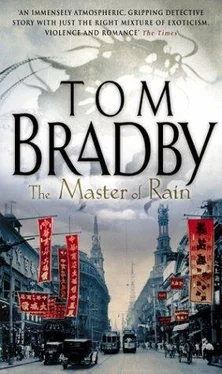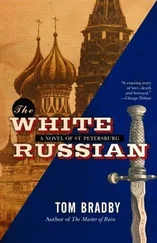“Chen, this is Field.”
There was a pause. “You should not be here.”
“I need you to tell me something. I pulled Lu’s surveillance notes from Registry. They said that he goes out to Nantao every day at one o’clock and returns an hour later. That’s what happened the other day, but I need to know whether his routine ever changes for any reason. Does he come back earlier? What does he do there? The notes say he conducts business from some tea-”
“Don’t do it, Field. Don’t risk it.”
“I have no choice.”
“You’re right. Get on a boat. Go home. Survive.”
Field paused. “I want more than just my own survival.”
“Sometimes there is no more.”
Field parked in the street opposite Lu’s house, about fifty yards from the intersection. It was already past noon.
On the far side of the street, a Chinese servant was sweeping the path to the back gate of his employer’s house. Field could see the lush expanse of green lawn beyond. Otherwise, the road was deserted. Natasha and Alexei were huddled together in the backseat.
Field checked his watch impatiently until it was ten to one. Then he eased his foot down on the low speed pedal. “Try to come to the window,” he said. He turned, but she did not look up. “Natasha, as soon as you are in the room, please try and come to the window so that I know you’re all right.”
He slowed the car to a halt ten yards from the Rue Wagner.
Two young children-a boy and a girl-emerged from the house opposite Lu’s and began to play with a hoop, spinning it to each other, then keeping it rolling with a stick.
Field looked at his watch again. It was six minutes to one.
The door opened. One of the bodyguards came out and took up his position at the bottom of the steps. Grigoriev emerged, checked up and down the street, then went back inside.
The first man waited for a few moments, then walked down the road until he was out of sight.
The car pulled up. Grigoriev and three others moved swiftly down the steps and surrounded it.
The children had stopped playing and were watching the car’s exhaust fumes billow into the still air.
Field’s eyes were fixed on the front door. He could feel the adrenaline pumping through his veins. Grigoriev pointed in their direction, and the two men closest took a couple of paces toward them, raising their machine guns.
Field fingered his revolver but knew there was nothing he could do if they came any nearer.
Lu came out, moving slowly. Grigoriev barked an order in Russian. Lu ducked down into the backseat, and the car slid away from the curb.
“Now,” Field said.
Natasha kissed Alexei on the forehead and touched his face with the palm of her hand. He gripped her arm and wouldn’t let go. She released his fingers gently, without taking her eyes from his face, then kissed his forehead. She said something in Russian that Field could not understand.
Field felt his vision blurring.
Natasha opened the door and stepped out onto the sidewalk.
She walked toward the house, pulling her raincoat tight around her waist.
She reached the steps and knocked on the door. She turned back once, then stepped out of sight as it was opened.
Field unclenched his fists. He checked his watch. It was just past one.
Alexei clambered over into the seat beside him.
“It’s all right,” Field said, wishing he believed it.
The boy didn’t respond.
Field scanned the windows of the house and then up and down the street. He lit a cigarette, gripping the handle of his revolver as he smoked, the metal cold against his palm.
The boy was still watching him.
Field leaned forward and looked up at the second-floor windows. They were dark, the curtains drawn. He lowered his gaze to the first floor, where he and Caprisi had had their audience with Lu, and where Natasha had told him she was always instructed to wait.
Why didn’t she show herself?
The cigarette burned his fingers. He threw it out of the window, wishing the American detective were with him now.
Field looked up toward Lu’s bedroom again.
Had he killed her today, as surely as if he’d pulled the trigger himself? He thought of Caprisi’s warnings and was haunted by the look of pain that he’d seen so often in the American’s eyes.
He looked at his watch. It was ten past one. “Shit,” he whispered. He wiped his forehead. “Shit.”
Alexei had not taken his eyes from Field’s face, but a creeping sense of hopelessness prevented Field from meeting the boy’s eye.
The two children crossed over and spun their hoop along the sidewalk outside Lu’s front door. They were both well dressed, the girl’s blond hair in a pigtail, the hem of her white dress twirling as she turned to chase the hoop. The boy shouted something and ran after her. The Chinese servant who had been sweeping leaves through the back gate of his master’s house stopped to watch them.
Field checked the windows again, but there was no movement. He could almost hear the minutes tick by.
Then he saw her. She had pulled the curtain back. She raised her hand, let it fall, and was gone.
Field stared at the curtains, willing her to reappear.
A Chinese woman in the uniform of a nanny or cook walked up to the front entrance and knocked. She was carrying a wicker basket filled with groceries. The door was opened. The children moved off down the road with their hoop in the direction of a well-dressed Frenchwoman who was leading a tiny dog, a large hat shielding her face from the midday sun.
The curtains did not move again.
Field expected to see her now. If she had got to the room and reached the ledgers, then it should be only a few minutes at most before she would leave.
It was half past one.
He tried not to think of what they would do with her if she was caught. Would they kill her in the house or take her somewhere else?
The full magnitude of what he had set in motion threatened to overwhelm him. She had always been a survivor, but he had forced her to risk her life for him, for what he wanted.
He had forced her.
Field gripped the revolver still harder. He wound down the window a fraction, but there was not a hint of wind. The street was deserted, save for the Chinese servant who had returned to sweeping the back entrance to his master’s house with the slow, methodical action of one who has no leaves left to sweep.
Field wiped his forehead with his sleeve and looked at his watch again. One-forty. He could feel the tension in his neck and back and legs as he looked up at the windows again. There was no sign of her.
Should he go in himself?
He glanced at Alexei. The boy was staring at him, desperation in his eyes.
“I had a wooden airplane,” Alexei said.
Field turned back to the house.
“When I went to the orphanage, they took it away.”
Field didn’t want Alexei to talk. He could feel a muscle at the corner of his eye start to twitch.
“I asked if I could see his car. He always said ‘soon.’ I would still like to see it. I think it is a big one. He is very rich and has many airplanes. Mama said one day soon we will go away from Shanghai, to a better place, and then we will be rich and be able to go on airplanes and have our own car and everything will be very good.”
“Come on,” Field said to himself, willing the door to open.
He realized that he had no idea how she would get the ledger out of the house. It would be too big to conceal.
“Mama said he is very rich and can go on an airplane anytime he wants and he gave me one. A big one. I wish Father Brown had not taken it away.”
The car was starting to feel like a furnace.
Читать дальше












